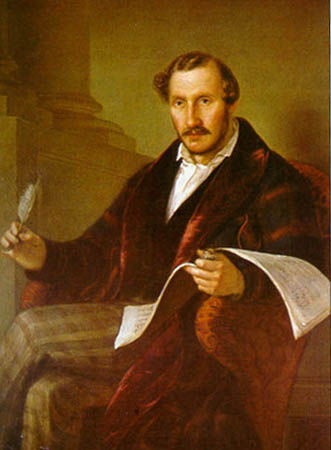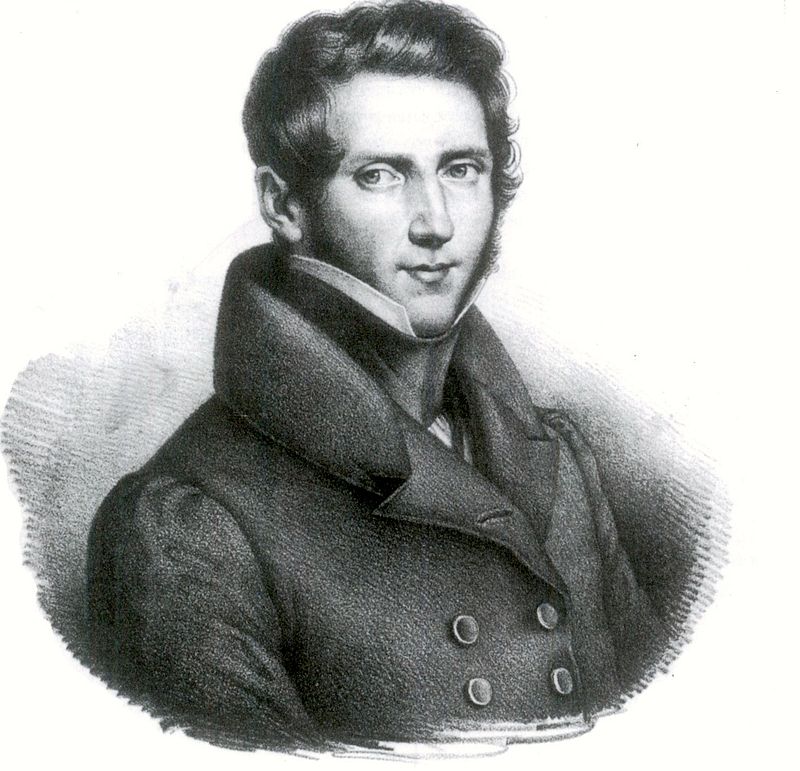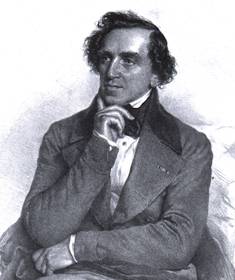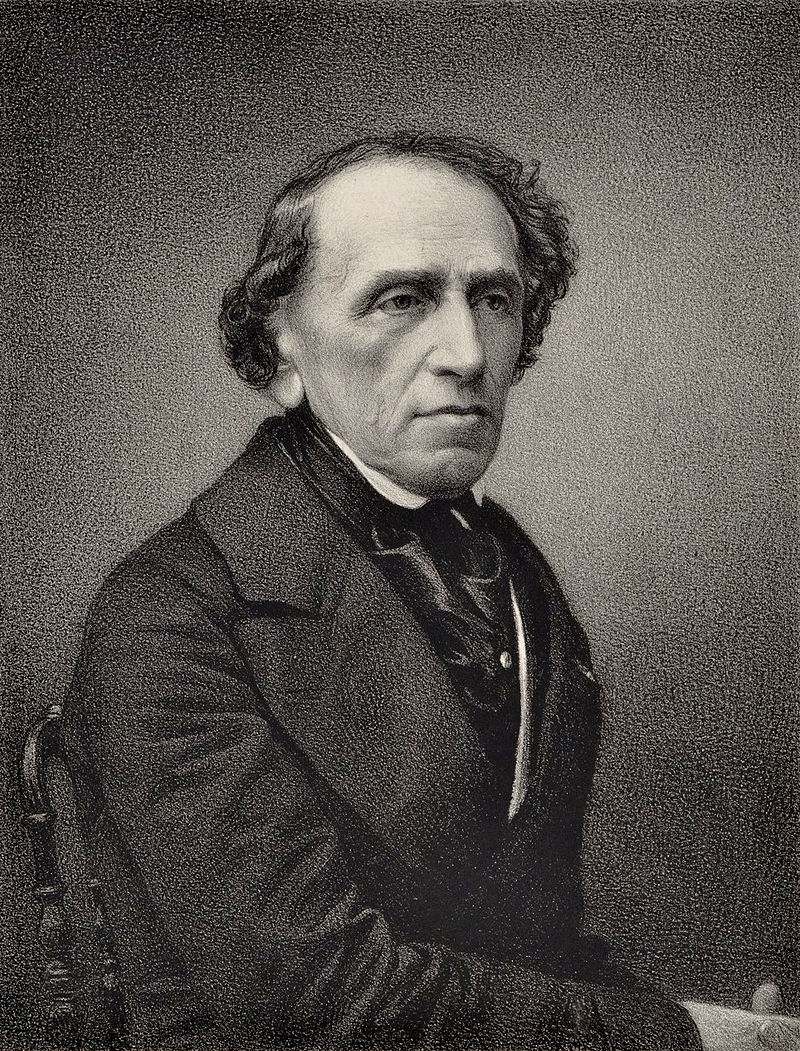<Back to Index>
- Composer Domenico Gaetano Maria Donizetti, 1797
- Composer Giacomo Meyerbeer, 1791
PAGE SPONSOR


Domenico Gaetano Maria Donizetti (29 November 1797 – 8 April 1848) was an Italian composer from Bergamo, Lombardy. His best - known works are the operas L'elisir d'amore (1832), Lucia di Lammermoor (1835), and Don Pasquale (1843), all in Italian, and the French operas La favorite and La fille du régiment (both from 1840). Along with Vincenzo Bellini and Gioachino Rossini, he was a leading composer of bel canto opera.
The youngest of three sons, Donizetti was born in 1797 in Bergamo's Borgo Canale quarter located just outside the city walls. His family was very poor with no tradition of music, his father being the caretaker of the town pawnshop. Nevertheless, Donizetti received some musical instruction from Simon Mayr, a German composer of internationally successful operas who had become maestro di cappella at Bergamo's principal church in 1802.
Donizetti was not especially successful as a choirboy, but in 1806 he was one of the first pupils to be enrolled at the Lezioni Caritatevoli school, founded by Mayr, in Bergamo through a full scholarship. He received detailed training in the arts of fugue and counterpoint, and it was here that he launched his operatic career. After some minor compositions under the commission of Paolo Zancla, Donizetti wrote his ninth opera, Zoraida di Granata. This work impressed Domenico Barbaia, a prominent theater manager, and Donizetti was offered a contract to compose in Naples. Writing in Rome and Milan in addition to Naples, Donizetti achieved some popular success in the 1820s (although critics were often unimpressed), but was not well known internationally until 1830, when his Anna Bolena was premiered in Milan. He almost instantly became famous throughout Europe. L'elisir d'amore, a comedy produced in 1832, came soon after, and is deemed one of the masterpieces of 19th century opera buffa (as is his Don Pasquale, written for Paris in 1843). Shortly after L'elisir d'amore, Donizetti composed Lucia di Lammermoor, based on the Sir Walter Scott novel The Bride of Lammermoor. It became his most famous opera, and one of the high points of the bel canto tradition, reaching stature similar to Bellini's Norma.
After the success of Lucrezia Borgia (1833) consolidated his reputation, Donizetti followed the paths of both Rossini and Bellini by visiting Paris, but his opera Marin Faliero suffered by comparison with Bellini's I puritani, and he returned to Naples to produce his already mentioned masterpiece, Lucia di Lammermoor. As Donizetti's fame grew, so did his engagements, as he was further hired to write in both France and Italy. In 1838, he moved to Paris after the Italian censor objected to the production of Poliuto (on the grounds that such a sacred subject was inappropriate for the stage); there he wrote La fille du régiment, which became another success.
As a conductor, he led the premiere of Rossini's Stabat Mater.
Donizetti's wife, Virginia Vasselli, gave birth to three children, none of whom survived. Within a year of his parents' deaths, his wife, on 30 July 1837, died from cholera. By 1843, Donizetti exhibited symptoms of syphilis and probable bipolar disorder. After being institutionalized in 1845, he was sent to Paris, where he could be cared for. After visits from friends, including Giuseppe Verdi, Donizetti was sent back to Bergamo, his hometown. After several years in the grip of insanity, he died in 1848 in the house of the noble family Scotti. After his death Donizetti was buried in the cemetery of Valtesse but in the late 19th century his body was transferred to Bergamo's Basilica of Santa Maria Maggiore near the grave of his teacher Simon Mayr.
Donizetti is best known for his operatic works, but he also wrote music in a number of other forms, including some church music, a number of string quartets, and some orchestral works.
He was the younger brother of Giuseppe Donizetti, who
had become, in 1828, Instructor General of the Imperial Ottoman Music at the court of
Sultan Mahmud II (1808 – 1839).


Giacomo Meyerbeer (5 September 1791 – 2 May 1864) was a noted German opera composer, and the first great exponent of "grand opera." At his peak in the 1830s and 1840s, he was the most famous and successful composer of opera in Europe, yet he is rarely performed today.
He was born to a Jewish family in Tasdorf (now a part of Rüdersdorf), near Berlin with the name Jacob Liebmann Beer. His father was the enormously wealthy financier Jacob Judah Herz Beer (1769 - 1825) and his much beloved mother, Amalia Liebmann Meyer Wulff (1767 - 1854) also came from the wealthy elite. Their other children included the astronomer Wilhelm Beer and the poet Michael Beer.
Beer's first keyboard instructor was Franz Lauska, a pupil of Johann Georg Albrechtsberger and a favored teacher at the Berlin court. Beer also became one of Muzio Clementi's pupils while Clementi was in Berlin, and old Clementi himself, although he had long given up teaching, was so much struck, during a visit to Berlin, with the promise displayed in the boy's performance as to consent to give Beer lessons. Beer made his public debut in 1801 playing Mozart's D minor Piano Concerto in Berlin. The Allgemeine musikalische Zeitung reported: 'The amazing keyboard playing of young Bär (a Jewish lad of 9), who carried off the difficult passages and other solo parts with aplomb, and has fine powers of rendition even more rarely found in one of his age, made the concert even more interesting'.
Throughout his youth, although he was determined to become a musician, Beer found it difficult to decide between playing and composition. Certainly other professionals in the decade 1810 - 1820, including Moscheles, considered him amongst the greatest virtuosi of his period.
Beer, as he still was, studied with Antonio Salieri and the
German master and friend of Goethe, Carl Friedrich Zelter.
Realizing that a full understanding of Italian opera was essential
for his musical development, however, he went to study in
Italy for some years, during which time he adopted the first
name "Giacomo." The "Meyer" in his surname he adopted
after the death of his great - grandfather. It was during
these years in Italy that he became acquainted with, and
impressed by, the works of his contemporary Gioachino Rossini.
The name Giacomo Meyerbeer first became known internationally with his opera Il crociato in Egitto — premiered in Venice in 1824 and produced in London and Paris in 1825; incidentally the last opera ever to feature a castrato. But Meyerbeer became virtually a superstar with Robert le diable (with libretto by Eugène Scribe and Casimir Delavigne), produced in Paris in 1831 and regarded by some as the first grand opera, although this honor rightly belongs to Auber's La muette de Portici.
The fusion of dramatic music, melodramatic plot, and sumptuous staging proved a sure - fire formula, which Meyerbeer would go on to repeat in Les Huguenots (1836), Le prophète (1849), and L'Africaine, (produced posthumously, 1865). All of these operas held the international stage throughout the 19th century, as did the more pastoral Dinorah (1859).
Meyerbeer, who had settled in Paris, left for Berlin in
1842 to take the post of court music director, but he
returned to Paris in 1849.
Meyerbeer's immense wealth (increased by the success of his operas) and his continuing adherence to his Jewish religion set him apart somewhat from many of his musical contemporaries. They also gave rise to malicious rumors that his success was due to his bribing musical critics. Richard Wagner accused him of being interested only in money, not music.
Meyerbeer was, however, a deeply serious musician and a
sensitive personality. He philosophically resigned himself
to being a victim of his own success: his extensive
diaries and correspondence — which survived the turmoil of
20th century Europe and have now been published in seven
volumes — are an invaluable source for the history of
music and theater in the composer's time. Meyerbeer was
interred in the Berlin Jewish cemetery in Schönhauser Allee,
amongst other members of the Beer family.
The vitriolic campaign of Richard Wagner against Meyerbeer was to a great extent responsible for the decline of Meyerbeer's popularity after his death in 1864. This campaign was as much a matter of personal spite as of racism - Wagner had learnt a great deal from Meyerbeer and indeed Wagner's early opera Rienzi (1842) has, facetiously, been called 'Meyerbeer's most successful work'. Meyerbeer supported the young Wagner, both financially and in obtaining a production of Rienzi at Dresden.
However, Wagner resented Meyerbeer's continuing success at a time when his own vision of German opera had little chance of prospering. After the May Uprising in Dresden of 1849, Wagner was for some years a political refugee facing a prison sentence or worse in Saxony. During this period when he was gestating his Ring cycle, he had few sources of income apart from journalism and benefactors, and little opportunity of getting his own works performed. The success of Le prophète sent Wagner over the edge, and he was also deeply envious of Meyerbeer's wealth. After Meyerbeer's death Wagner reissued his 1850 essay Das Judenthum in der Musik (Judaism in Music), in 1868, in an extended form, with a far more explicit attack on Meyerbeer. This version was under Wagner's own name - for the first version he had sheltered behind a pseudonym - and as Wagner had by now a far greater reputation, his views obtained far wider publicity.
These attacks on Meyerbeer (which also included a swipe at Felix Mendelssohn) are regarded by Paul Lawrence Rose as a significant milestone in the growth of German anti - Semitism.
Vernon Dobtcheff played
Giacomo Meyerbeer, (a relatively minor role), in the 1983
film Wagner.
Meyerbeer's costly operas, requiring grand casts of leading singers, were gradually dropped from the repertoire in the early 20th century. They were banned by the Nazi regime because the composer was Jewish, and this was a major factor in their further disappearance from the repertory. However, the operas are now beginning to be regularly revived and recorded, although (despite the efforts of such champions as Dame Joan Sutherland, who took part in performances of, and recorded, Les Huguenots) they have yet to achieve anything like the huge popular following they attracted during their creator's lifetime.
Amongst reasons often adduced for the dearth of modern productions are the scale of Meyerbeer's more ambitious works and the cost of mounting them, as well as the alleged lack of virtuoso singers capable of doing justice to Meyerbeer's demanding music. However, recent successful productions of some of the major operas at relatively small centers such as Strasbourg (L'Africaine, 2004) and Metz (Les Huguenots, 2004) show that this conventional wisdom is not unchallengeable.